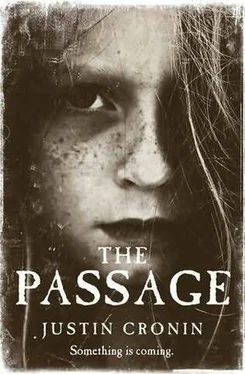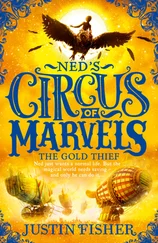There was nothing to do now but wait. Wait, and listen.
Because that was the thing: the radio was forbidden. The problem, as Michael understood it, had boiled down to too many people. It was the radio that had led the Walkers to the Colony in the early days, nothing the Builders had ever planned on, since the Colony wasn’t supposed to last as long as it had. So the decision had been made that right then, in the year 17-seventy-five years ago-the radio should be destroyed, the antenna taken down from the mountain, its parts chopped up and scattered in the dump.
At the time, it might have made sense. Michael could see how that was possible. The Army knew where to find them, and there was only so much food and fuel to go around, so much room under the lights. But not now. Not with the batteries the way they were, the lights about to fail. Blackness and screaming and dying, et cetera.
It wasn’t long after Michael’s conversation with Theo, not more than a few days as he recalled, that he had happened upon the old logbook-“happened” being not quite the correct word, as things turned out. It was the quiet hour, just before dawn. Michael had been sitting at the panel in the Lighthouse like always, minding the monitors and flipping through Teacher’s copy of What to Name the Baby (that’s how desperate he’d become for something new to read; he’d just made it to the I’s), when, for some unknown reason, restlessness or boredom or the discomfiting thought that if the winds had blown a little differently his parents might have named him Ichabod (Ichabod the Circuit!), his eyes had drifted upward to the shelf above his CRT, and there it was. A notebook with a thin black spine. Standing there among the usual whatnot, tucked between a spool of solder and a stack of Elton’s CDs (Billie Holiday Sings the Blues, Sticky Fingers by the Rolling Stones, Superstars #1 Party Dance Hits , a group called Yo Mama that sounded to Michael like a bunch of people yelling at each other, not that he understood the first thing about music). Michael must have looked right at it a thousand times, and yet he couldn’t remember seeing it before; that was curious, the thought that gave him pause. A book, something he hadn’t read. (He’d read everything.) He rose and took it from its place on the shelf, and when he cracked the spine the first thing he saw, inscribed in a precise hand, an engineer’s hand, was a name he knew: Rex Fisher. Michael’s great (great-great?) grandfather. Rex Fisher, First Engineer of Light and Power, First Colony, California Republic. What the hell? How had he missed this? He turned the pages, crinkled with moisture and age; it took only a moment for his mind to parse the information, to break it into its components and reassemble it into a coherent whole that told him what this slender, ink-filled volume was. Columns of numbers, with dates written in the old style, followed by the hour and another number Michael understood to be the frequency of transmission, and then, in the spaces to the right, short notations, rarely more than a few words but heavy with suggestion, whole stories folded into them: “unmanned distress beacon” or “five survivors” or “military?” or “three en route from Prescott, Arizona.” There were other place names, too: Ogden, Utah. Kerrville, Texas. Las Cruces, New Mexico. Ashland, Oregon. Hundreds of such notations, filling page after page, until they simply stopped. The final entry read, simply, “All transmission ceasing by order of the Household.”
A glow was paling the windows by the time Michael finished. He doused the lantern and rose from his chair as Morning Bell began to peal-three solid rings followed by a pause of identical duration, then three more in case you didn’t get the message the first time (it’s morning; you’re alive)-and crossed the mazelike clutter of the narrow room with its plastic bins of parts and scattered tools and dirty dishes in teetering piles (why Elton couldn’t just eat in the barracks Michael had no idea; the man was just flat-out disgusting), stepped to the breaker panel, and powered down the lights. A wave of weary satisfaction washed through him, as it always did at Morning Bell: one more night’s work accomplished, all souls safe and sound to face another day. Let’s see Alicia and her blades do that . (And wasn’t it true that when he’d lifted his face to see the logbook, it had been the image of Alicia in his mind that had distracted him? As it sometimes-often-did? And not just Alicia but the specific picture of sunlight flaring her hair as she had stepped from the Armory that very evening, Michael moving down the path toward her, unseen? An image that was, as he considered it again, quite striking? All this despite the fact that Alicia Donadio was, in point of fact, the single most annoying woman on earth, not that there was such a vast field of competitors?) He returned to the panel and moved through the steps, flipping the cells to charge, turning on the fans and opening the vents; the meters, which stood at 28 percent across the board, began to flicker and rise.
He swiveled to look at Elton, who appeared to be dozing in his chair, though it was sometimes hard to tell. Waking and sleeping, Elton’s eyes were always the same, two thin strips of yellow jelly, peeking through slitted eyelids of perpetually tearing dampness that never quite managed to close. His pale hands were folded over the curve of his belly, the earphones, as always, clamped to the sides of his scaly head, pumping out the music he listened to all night. The Beatles. Boyz-B-Ware. Art Lundgren and his All-Girl Polka-Party Orchestra (the only one that Michael sort of liked).
“Elton?” No answer. Michael turned his voice up a notch. “Elton?”
The old man-Elton was fifty at least-startled to life. “Flyers, Michael. What time is it?”
“Relax. It’s morning. We’re down for the night.”
Elton screwed himself up in his chair, setting the hinges creaking, and drew the earphones down into the folds of his neck. “Then what you wake me up for? I was just getting to the good part.”
Next to the CDs, Elton’s nightly forays into imagined sexual adventure constituted his major pastime-dreams of women, conveniently long dead, which he would recount to Michael in excruciating detail, claiming that these were actually memories of things that had happened to him in his younger days. It was all bullshit, Michael figured, since Elton hardly ever set foot outside the Lighthouse, and to look at him now, with his dandruffy head and tangled beard and gray teeth clotted with the remains of a meal he had probably eaten two days ago, Michael didn’t see how any of it was even remotely possible.
“Don’t you want to hear about it?” The old man gave his eyebrows a suggestive wag. “It was the hay dream. I know you like that one.”
“Not now, Elton. I… found something. A book.”
“You woke me up because you found a book?”
Michael scooted his chair down the length of the panel and placed the log in the old man’s lap. Elton ran his fingers over the cover, his sightless eyes turned upward, then drew it to his nose and gave a long sniff.
“Now, I’d say that would be your great-grandfather’s logbook. Thing’s been floating around here for years.” He passed it back to Michael. “Can’t say I’ve read it myself. Find anything good in there?”
“Elton, what do you know about this?”
“Couldn’t say. Things do have a way of popping up right when you need them, though.”
Which was when Michael realized why he hadn’t seen the book before. He hadn’t seen it before because it wasn’t there.
“You put it on the shelf, didn’t you?”
“Now, Michael. Radio’s forbidden. You know that.”
Читать дальше












